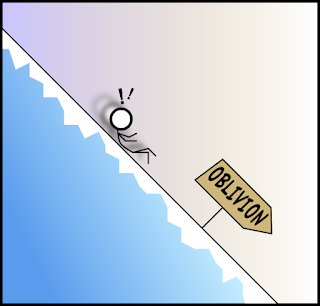We have all heard of a slippery slope. If not, here's an example. When I was in middle school, I brought gum to class once. My best friend asked me for a piece, so I reached into my pocket to hand him one. My teacher saw this and stopped it. I, of course, ask why? She replied, "Do you have a piece for everybody in the class?" I looked in the gum package and did not have a piece for everyone. She said, "Well, if you give him a piece, then the person next to you will also want a piece, then the person next to them, and so on." As she said this, I looked toward my classmates, and they all nodded their heads in agreement. If I gave one piece of gum to a person, then everyone would want one, so I could not give a piece to my friend unless I had enough to share with everyone, including the teacher. As a side note, my teacher's rule went for anything "special" that could be given to someone in the class.
At the time, I didn't understand why, but as I grew older, I understood that she was trying to teach us the concept of a slippery slope; but at a minor level, of course. However, in the real world, there are a lot of slippery slopes around us, and they are not being done at minor levels anymore. So, after reading Checkbook Journalism's Slippery Slope, I realized that this is a bigger problem than I understood it to be.
In that article, they explain how bribing or paying money for information in journalism leads to a slippery slope. But, to play devil's advocate, I understand why journalists would want to pay money for a story or information. If their job is on the line and they need a juicy story, but no one is willing to talk without payment, I understand why they would pay; not that I agree with it.
Bribing or paying for information is a slippery slope because it only leads to bad things. You have to do it for everyone once you do it for one person, like the gum story. A question the article gives is, "Why would you talk to a reporter for free if you can get 500 quid, say, from another one?" This question brings another problem along with this slippery slope. Once one reporter bribes, they are ahead of their competition because they will always have the information over a reporter who doesn't bribe. So then, the reporter who doesn't bribe, at first, starts to be on the same playing field as his competition, then corrupts the whole practice of journalism as a whole.
When looking for examples of this being a slippery slope in journalism, I stumbled upon the phrase "Brown envelope journalism." To my understanding, from a research article by Cleves Nike Mongo, it is when an entity gives journalists money to write a false story about them to make them look good. It is like the Checkbook article but in reverse.
My question is, when does the slippery slope end? You start at one place, a journalist offering money for information; Then we get to the opposite where other people offer journalists money. Does the slope keep going, and does journalism keep becoming more and more corrupt? Do we crash at the bottom of this slope and not have journalism? Or do we have the next generation of journalists come to the rescue and put an end to it?

No comments:
Post a Comment